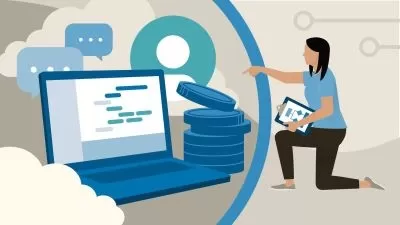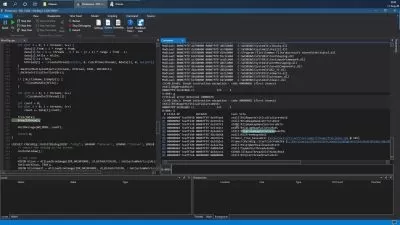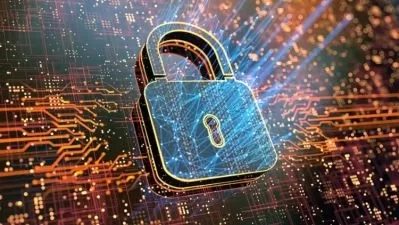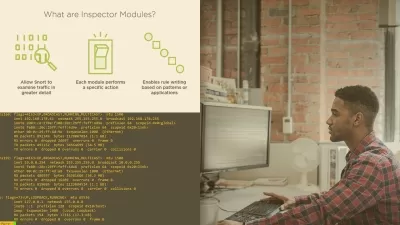Computer Hacking Forensic Investigator (CHFI) Unofficial
Kareem Ullah
1:34:54
Description
Master CHFI: Complete Guide to Digital Forensics, Solving Cyber Mysteries & Digital Investigations. (CHFIv10) Exam Prep
What You'll Learn?
- Foundations of Digital Forensics
- Role and responsibilities of a Certified Hacking Forensic Investigator (CHFI).
- Understanding computer hardware components and configurations.
- Data recovery techniques for damaged or deleted data.
- Understanding the nature of cybercrimes and their impact.
- Digital Evidence Examination
- Data analysis and examination methods, including identifying file signatures and hashing.
- Network Forensics and its importance.
- Investigating network intrusions and incidents.
- Malware Forensics
- Techniques for analyzing and reverse engineering malware.
- Mobile and IoT Device Forensics
- Learn how to creating comprehensive forensic reports.
- CHFI Exam Preparation
- and much more
Who is this for?
What You Need to Know?
More details
DescriptionWelcome to our comprehensive course, 'Mastering Digital Forensics: Computer Hacking Forensic Investigator (CHFI) Unofficial.' In this transformative journey, you'll delve deep into the world of digital forensics, equipping yourself with essential knowledge and hands-on skills.
Computer Hacking Forensic Investigation (CHFI) is a professional certification program and training course offered by the EC-Council (International Council of E-Commerce Consultants). The CHFI certification is designed to equip individuals with the knowledge and skills necessary to become proficient in computer forensics and cybercrime investigation.
I will begin by introducing you to the foundations of digital forensics, exploring its history, the role of a CHFI investigator, and the critical concept of digital evidence. You'll gain a solid understanding of computer systems, hardware, operating systems, storage devices, and data acquisition techniques.
Next, we'll dive into the realm of cybercrime investigation, covering topics such as understanding cybercrime, the legal landscape, and the investigative process. You'll learn how to handle digital evidence, manage chain of custody, preserve data, and perform effective analysis.
My course also delves into network forensics, malware analysis, and the challenges of mobile and IoT device forensics. You'll acquire the skills needed to investigate network intrusions, dissect malware, and extract evidence from diverse digital sources.
As you progress, you'll master the art of creating comprehensive forensic reports, providing expert witness testimony, and presenting findings effectively.
I will conclude with an overview of the CHFI exam, ensuring you're well-prepared to earn this prestigious certification.
Here are some key aspects of the CHFI certification:
Purpose: CHFI is aimed at professionals who want to specialize in investigating and analyzing digital evidence related to cybercrimes and security breaches. It is particularly valuable for those working in law enforcement, cybersecurity, incident response, and IT security.
Curriculum: The CHFI course covers a wide range of topics related to digital forensics, including evidence collection, preservation, analysis, and reporting. It also includes modules on computer hardware, operating systems, file systems, network forensics, and malware analysis.
Skills Developed: Participants in CHFI training learn how to collect and analyze digital evidence from various sources such as computers, mobile devices, networks, and the cloud. They also acquire the skills needed to identify, respond to, and mitigate cybersecurity incidents.
Certification Exam: After completing the CHFI training course, individuals can take the CHFI certification exam. Successfully passing this exam demonstrates their proficiency in digital forensics and their ability to conduct cybercrime investigations effectively.
Legal and Ethical Considerations: CHFI training emphasizes the importance of adhering to legal and ethical standards when conducting investigations. Professionals are taught how to handle digital evidence in a manner that ensures its admissibility in court.
Career Opportunities: CHFI certification can open up various career opportunities in law enforcement agencies, cybersecurity firms, corporate security departments, and consulting firms. It is highly regarded in the field of digital forensics and incident response.
CHFI is a valuable certification for individuals seeking to specialize in digital forensics and cybercrime investigation. It equips professionals with the knowledge and skills needed to effectively investigate and respond to cybersecurity incidents and help organizations protect their digital assets.
Join us in this dynamic journey into digital forensics, where you'll gain the expertise needed to navigate the digital landscape, uphold justice, and excel in your career.
Thank you.
IMPORTANT before enrolling:
This course is not intended to replace studying any official vendor material for certification exams, is not endorsed by the certification vendor, and you will not be getting the official certification study material or a voucher as a part of this course.
Who this course is for:
- Law Enforcement Professionals: Police officers, detectives, and law enforcement personnel who need to investigate cybercrimes and gather digital evidence for criminal cases.
- Cybersecurity Professionals: Cybersecurity analysts, incident responders, and cybersecurity specialists looking to enhance their skills in digital forensics for threat detection and incident response.
- IT Security Specialists: IT professionals responsible for securing computer systems and networks who want to understand how digital forensics can be applied to improve security measures.
- Legal and Compliance Professionals: Legal professionals, paralegals, and compliance officers interested in understanding the legal and ethical aspects of digital evidence collection and its admissibility in court.
- Digital Forensics Analysts: Individuals aspiring to work as digital forensics analysts, investigators, or consultants, whether in a corporate, government, or private practice setting.
- Students and Researchers: College students studying computer science, cybersecurity, or related fields who want to gain a deeper understanding of digital forensics principles.
- Ethical Hackers and Penetration Testers: Ethical hackers and penetration testers seeking to expand their skill set by learning how to analyze digital evidence and assess security breaches.
- Anyone Interested in Cybersecurity and Digital Investigations: Enthusiasts, hobbyists, and individuals interested in exploring the fascinating world of digital forensics and cybercrime investigation.
- Course caters to both beginners looking to build a strong foundation in digital forensics and professionals seeking to advance their existing knowledge and skills. It covers a wide range of topics, from basic concepts to advanced techniques, making it accessible and beneficial to a broad audience within the cybersecurity and digital forensics domain.
Welcome to our comprehensive course, 'Mastering Digital Forensics: Computer Hacking Forensic Investigator (CHFI) Unofficial.' In this transformative journey, you'll delve deep into the world of digital forensics, equipping yourself with essential knowledge and hands-on skills.
Computer Hacking Forensic Investigation (CHFI) is a professional certification program and training course offered by the EC-Council (International Council of E-Commerce Consultants). The CHFI certification is designed to equip individuals with the knowledge and skills necessary to become proficient in computer forensics and cybercrime investigation.
I will begin by introducing you to the foundations of digital forensics, exploring its history, the role of a CHFI investigator, and the critical concept of digital evidence. You'll gain a solid understanding of computer systems, hardware, operating systems, storage devices, and data acquisition techniques.
Next, we'll dive into the realm of cybercrime investigation, covering topics such as understanding cybercrime, the legal landscape, and the investigative process. You'll learn how to handle digital evidence, manage chain of custody, preserve data, and perform effective analysis.
My course also delves into network forensics, malware analysis, and the challenges of mobile and IoT device forensics. You'll acquire the skills needed to investigate network intrusions, dissect malware, and extract evidence from diverse digital sources.
As you progress, you'll master the art of creating comprehensive forensic reports, providing expert witness testimony, and presenting findings effectively.
I will conclude with an overview of the CHFI exam, ensuring you're well-prepared to earn this prestigious certification.
Here are some key aspects of the CHFI certification:
Purpose: CHFI is aimed at professionals who want to specialize in investigating and analyzing digital evidence related to cybercrimes and security breaches. It is particularly valuable for those working in law enforcement, cybersecurity, incident response, and IT security.
Curriculum: The CHFI course covers a wide range of topics related to digital forensics, including evidence collection, preservation, analysis, and reporting. It also includes modules on computer hardware, operating systems, file systems, network forensics, and malware analysis.
Skills Developed: Participants in CHFI training learn how to collect and analyze digital evidence from various sources such as computers, mobile devices, networks, and the cloud. They also acquire the skills needed to identify, respond to, and mitigate cybersecurity incidents.
Certification Exam: After completing the CHFI training course, individuals can take the CHFI certification exam. Successfully passing this exam demonstrates their proficiency in digital forensics and their ability to conduct cybercrime investigations effectively.
Legal and Ethical Considerations: CHFI training emphasizes the importance of adhering to legal and ethical standards when conducting investigations. Professionals are taught how to handle digital evidence in a manner that ensures its admissibility in court.
Career Opportunities: CHFI certification can open up various career opportunities in law enforcement agencies, cybersecurity firms, corporate security departments, and consulting firms. It is highly regarded in the field of digital forensics and incident response.
CHFI is a valuable certification for individuals seeking to specialize in digital forensics and cybercrime investigation. It equips professionals with the knowledge and skills needed to effectively investigate and respond to cybersecurity incidents and help organizations protect their digital assets.
Join us in this dynamic journey into digital forensics, where you'll gain the expertise needed to navigate the digital landscape, uphold justice, and excel in your career.
Thank you.
IMPORTANT before enrolling:
This course is not intended to replace studying any official vendor material for certification exams, is not endorsed by the certification vendor, and you will not be getting the official certification study material or a voucher as a part of this course.
Who this course is for:
- Law Enforcement Professionals: Police officers, detectives, and law enforcement personnel who need to investigate cybercrimes and gather digital evidence for criminal cases.
- Cybersecurity Professionals: Cybersecurity analysts, incident responders, and cybersecurity specialists looking to enhance their skills in digital forensics for threat detection and incident response.
- IT Security Specialists: IT professionals responsible for securing computer systems and networks who want to understand how digital forensics can be applied to improve security measures.
- Legal and Compliance Professionals: Legal professionals, paralegals, and compliance officers interested in understanding the legal and ethical aspects of digital evidence collection and its admissibility in court.
- Digital Forensics Analysts: Individuals aspiring to work as digital forensics analysts, investigators, or consultants, whether in a corporate, government, or private practice setting.
- Students and Researchers: College students studying computer science, cybersecurity, or related fields who want to gain a deeper understanding of digital forensics principles.
- Ethical Hackers and Penetration Testers: Ethical hackers and penetration testers seeking to expand their skill set by learning how to analyze digital evidence and assess security breaches.
- Anyone Interested in Cybersecurity and Digital Investigations: Enthusiasts, hobbyists, and individuals interested in exploring the fascinating world of digital forensics and cybercrime investigation.
- Course caters to both beginners looking to build a strong foundation in digital forensics and professionals seeking to advance their existing knowledge and skills. It covers a wide range of topics, from basic concepts to advanced techniques, making it accessible and beneficial to a broad audience within the cybersecurity and digital forensics domain.
User Reviews
Rating
Kareem Ullah
Instructor's Courses
Udemy
View courses Udemy- language english
- Training sessions 31
- duration 1:34:54
- Release Date 2023/11/14















